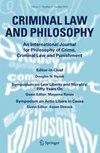警察的概念
IF 0.7
Q2 LAW
引用次数: 0
摘要
摘要现代警察的组织形式是一种偶然的社会选择,是在规范街道公共秩序的过程中如何参与治理的过程。警察是被授权在应对公共紧急情况时履行国家管理职责的机构。当有一些紧急的社会需求可以通过行动来解决,而某些人或机构有资源和能力采取这种行动时,治理的责任就存在了。责任是非个人的:任何具备相关技能的人都有义务采取行动解决相关需求。然而,当太少的人回应或太多的人竞争解决需求时,问题就会出现。因此,治理的一个核心特征是创建具有特殊权力、资源和能力的公众认可的机构,以便在需要有人介入并做某些排除普通公众成员的事情时解决对公共服务的需求。警察机关的权力和职责更加多样化。这些权力是改变与警察互动的人的法律地位的规范性权力,而不是使用一定程度的暴力来强迫个人服从警察的要求的实际权力。警察的核心权力包括就如何应对紧急情况、拘留个人和侵犯其人身或财产作出权威决定的权力,以及管理、保护和在对自己有风险的情况下进行干预的共同职责。占主导地位的方法试图将警察与其他机构区分开来,利用警察的能力使用暴力来应对公共紧急情况。然而,在基于治理的警察模式中,使用武力的能力只是警察可用的资源之一,并没有将他们与其他公共治理机构区分开来。本文章由计算机程序翻译,如有差异,请以英文原文为准。
The Concept of the Police
Abstract The organization of the modern police is a contingent social choice about how to engage in the process of governance when regulating public order on the street. The police are the agency authorized to act upon the state’s duty to govern in response to public emergencies. The duty to govern exists when there is some urgent social need that could be resolved by acting, and some person or institution has the resources and ability to do that act. The duty is impersonal: anybody with the relevant skill set is obligated to act to address the relevant need. Problems can arise, however, when too few individuals respond or too many compete to resolve the need. A core feature of governance, then, is to create publicly recognized institutions with special authority, resources, and abilities to address the demand for public services when someone needs to step in and do something to the exclusion of ordinary members of the public. Police agencies are further characterized by various powers and duties. These powers are normative powers to change the legal status of the people with whom the police interact, rather than physical powers to use some amount of violence to coerce individuals to comply with police demands. The core powers of the police include the powers to make authoritative determinations about how to respond to an emergency, to detain individuals, and to trespass upon their person or property, along with conjoined duties to govern, to protect, and to intervene at risk to themselves. The dominant approach attempts to distinguish the police from other institutions using the police ability to use violent to respond to public emergencies. On the governance based model of the police, however, the ability to use force is simply one of the resources available to the police, and does not mark them off as different from other public governance agencies.
求助全文
通过发布文献求助,成功后即可免费获取论文全文。
去求助
来源期刊
CiteScore
1.10
自引率
0.00%
发文量
24
期刊介绍:
Rationale The philosophy of crime and criminal law has been undergoing a renaissance.Increasing numbers of lawyers and philosophers are researching, writing and teaching in the area. Lawyers who are exploring theoretical issues related to criminal liability and punishment find that they must turn to philosophy. Philosophers recognise the importance of the criminal law as a focus for both analytical and normative inquiry. The practical importance of the subject is also obvious, especially at a time when western governments are having to reconsider their rationales for criminalization and sentencing in the light of substantial changes in criminal justice systems and their social contexts. Until recently, there was no journal solely devoted to the philosophy of crime and criminal law. Criminal Law and Philosophy fills this gap, and provides a platform for the high quality work that is being done in this area.
High quality content; specific and inclusive in scope Criminal Law and Philosophy aims to publish high quality articles that take a philosophical perspective on any issues in the broad field of crime and punishment. The main areas and topics include: crime and criminalization; the content, principles and structure of substantive criminal law; criminal justice and the criminal process; punishment and sentencing. The journal is inclusive in its scope: it publishes articles with a historical focus on earlier philosophical discussions of crime and punishment, as well as articles with a more contemporary focus. It seeks contributions from a range of philosophical schools and approaches, in particular both from analytically oriented philosophers and from those who draw more on contemporary continental philoshophy. Readership Criminal Law and Philosophy is becoming essential reading for academics in philoso phy, in law and in criminology who take a philosophically informed critical, analytical or normative approach to the criminal law and criminal justice. It is also an important resource for students in those subjects, and for practitioners with an interest in philosophical approaches to their practice. Through this journal, readers can access the latest thinking by the best scholars in the philosophy of crime and punishment. Editorial Board The editors, editorial board and advisors constitute an impressive, international group of leading scholars working in the philosophy of crime and punishment. They represent a variety of systems of criminal law, including systems that cross national boundaries.

 求助内容:
求助内容: 应助结果提醒方式:
应助结果提醒方式:


